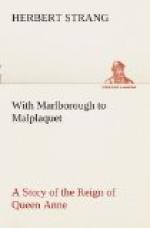“Great Heaven!” ejaculated George Fairburn, as his eye suddenly fell upon the Duke fighting his way out of the group, and in company with fifty more he flew to the spot. At that moment Marlborough, now almost clear, put his horse to a ditch across his track. How it happened no one could tell exactly, but the rider fell, and dropped into the little trench. Marlborough’s career appeared at an end. His steed was cantering madly over the field.
But friends were at hand, and before the Frenchmen could complete their work the little company had beaten them off. George leapt to the ground, and drew his horse towards the General, who had sprung to his feet in a trice, nothing the worse.
“Here, sir,” said the lieutenant, handing the bridle to an officer in a colonel’s uniform, who stood at hand, and the colonel held the animal while the Duke mounted.
[Illustration: The Rescue of Marlborough.]
Before the Duke had fairly gained his seat in the saddle, a ball with a rustling hum carried off the head of the unfortunate colonel. It was an appalling sight, and George Fairburn was forced to turn away his eyes.
The crisis was too serious, however, to waste time in vain regrets. Without the loss of a moment Marlborough led the charge upon the enemy. The famous Household Brigade fell back, and the village of Ramillies was taken. Then another fierce struggle, but a brief one, and the Tomb of Ottomond was secured, the position which commanded the whole field. The battle was almost at an end.
There remained only the village of Anderkirk in its marshy hollow, and Marlborough called together his forces from the various parts of the confused field. Another charge was sounded, the last. The enemy turned and fled. Ramillies was won.
The victory, quite as important in its way as Blenheim, had been gained in a little over three hours. The loss on the side of the Allies was hardly four thousand; that of the French and Bavarians, in killed, wounded, and prisoners, was four times as great. All the enemy’s guns, six only excepted, fell into the hands of the victors.
There was one heavy drawback to the pride which the young Lieutenant Fairburn naturally felt at having had a humble share in the great victory. At the muster of the survivors of his regiment Blackett was missing. Half the night did George search for him, and was at last rewarded by finding the young fellow lying wounded and helpless on the boggy ground. It was an intense relief when the surgeon gave good hopes of Matthew’s ultimate recovery.
“I’m done for this campaign, old friend,” Blackett said with a feeble smile to George, “and must be sent home for a while. But I hope to turn up among you another year.”




